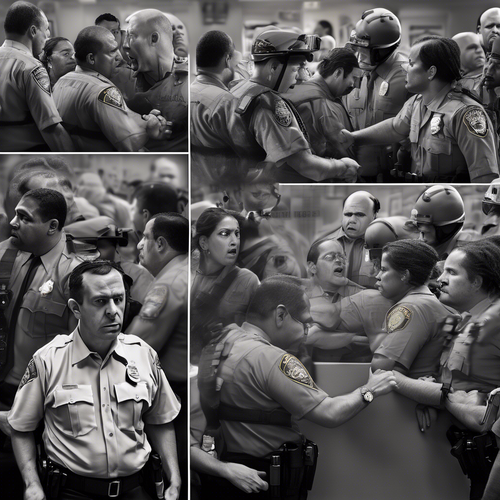Trump’s Call to Immigration Agents: A Controversial Stand Against ‘THUGS’ 👮♂️😡
Recently, former President Donald Trump urged immigration agents to take a firm stand against what he dubbed “thugs” in the context of rising tensions and violent clashes across the country. In a rhetoric that felt as combative as a prizefight, he rallied his supporters with a curious mix of bravado and bewilderment. One has to wonder, though: is this an earnest plea for justice, or a theatrical display that hides a deeper irony? 🤔
As images of chaos flash across screens and neighborhoods become battlegrounds, Trump’s statements resonate with a duality that reflects both a leader’s promise and a populist’s fearmongering. At the heart of this controversy lies the question of how to balance law enforcement with the preservation of civil liberties—a tug-of-war as age-old as the nation itself.
The Irony of the Narrative ⚖️
On one hand, Trump’s words paint a vivid tableau of vigilante justice, where immigration agents are portrayed as gallant knights seeking to restore order. But on the flip side, there’s a gnawing irony in using “thugs” as a label, a term laden with racial and socioeconomic undertones that evokes historical prejudices. These contrasting ideas force us to confront uncomfortable truths about the narrative used to justify authority in a land that prides itself on freedom and equality.
Consider this: how often have we seen the term “thug” employed to criminalize entire communities, drawing a stark line between “us” and “them”? This attempt to rally the troops could very well sow discord within society, fostering an ‘us versus them’ mentality that diminishes complexity to mere label-making. It’s almost as if, in a desperate bid for relevance, Trump has chosen to rewrite the script of a nation grappling with its identity.
The Unfolding Clashes: An Examination of Violence 📉
Violent clashes erupt not only from the streets but also from deep-rooted societal fractures. Statistics reveal a grim landscape: according to the FBI, hate crimes surged by over 20% in recent years, suggesting that these “thugs” are often products of a complex societal fabric woven with threads of poverty, injustice, and alienation. Yet, Trump’s focus on arrests overlooks a more challenging yet vital question: how do we tackle the underlying causes of violence? 🥊
- Poverty and Inequality: Hurdles like systemic poverty breed desperation, pushing individuals toward criminal acts as a means of survival.
- Gun Violence: With increased accessibility to firearms, the question of public safety becomes intertwined with mental health resources and legislative action.
- Racial Tensions: An atmosphere of distrust between communities and law enforcement often escalates conflicts, leading to violent confrontations.
These multifaceted issues challenge the simplistic view that arrests alone can vanquish the perceived “criminal element.” How effective is a round-up of “thugs” if, beneath that label, lie the stories of disenfranchised individuals yearning for change?
Immigration Agents and Their Role in Society 🌍
Trump’s call for immigration agents to act decisively brings to the forefront their complex role in law enforcement. They are neither only enforcers nor simply protectors of borders; they are individuals tasked with navigating a web of moral dilemmas. The juxtaposition of their duties raises critical questions:
- Enforcement vs. Empathy: Can agents uphold the law while understanding the socio-economic realities that lead to clashes?
- Community Trust: How can law enforcement bridge the gap between authority and the communities they serve, especially in immigrant populations?
- Political Pressure: Will individual choices come under the weight of political narratives that push for stricter enforcement, often overshadowing individual human stories?
It’s a precarious balance, and the call to arms issued by Trump simplifies a spectrum of humanity into mere buzzwords—”thugs” being one of the most charged. While the urgency of the moment demands action, it also necessitates a greater awareness of the consequences of labeling society’s most vulnerable.
A Nation at a Crossroads: The Path Forward 🚦
In the aftermath of Trump’s remarks, the nation finds itself at a critical juncture. Should immigration agents rush to apprehend “thugs” as a decisive measure, or is there a call for broader strategies that address the root causes of violence and societal division? It’s a dilemma that requires more than just a knee-jerk reaction; it demands thoughtful discourse, community engagement, and socio-political reforms. 🗣️
Ultimately, the narrative surrounding “thugs” and violence unveils the larger struggle within America—a struggle between the rule of law and the pursuit of justice. In a world where political rhetoric often drowns out substance, one has to ask: when will we prioritize the stories behind the labels, and recognize that every statistic represents a human experience? As the dust settles, may we strive for understanding over division, and compassion over confrontation. 🤝

